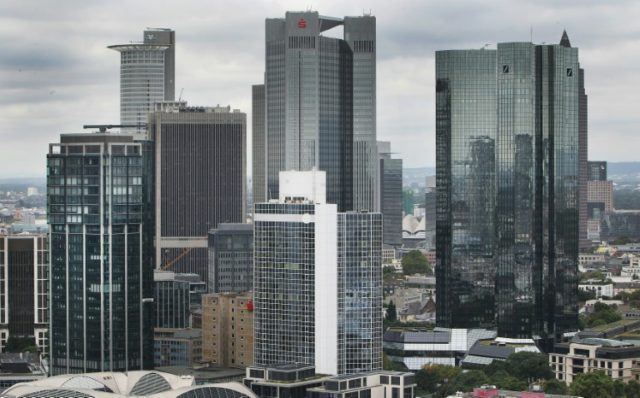Frankfurt am Main (AFP) – As the prospect of a hard Brexit looms, Frankfurt is taking big strides in the competition among European financial centres to lure banks away from London.
On Monday, representatives from 25 major banks trooped into the unremarkable office block on the outskirts of Frankfurt that houses German financial regulator BaFin.
As British lawmakers prepared to debate the bill set to launch the country out of the European Union, the bankers were learning about the registration process and regulatory requirements in Germany.
“We now have to be pragmatic and give financial institutions the necessary clarity about regulation,” BaFin’s deputy bank oversight director Peter Lutz told journalists at a press conference following the meeting.
“The way BaFin presented itself really came across well. From our perspective it was a success,” Oliver Wagner, managing director of the Association of Foreign Banks in Germany (VAB), told AFP.
Britain’s departure means London-based banks may no longer be able to serve clients in the remaining 27 EU member states or perform euro-denominated trades under so-called “passporting” rules.
Although Prime Minister Theresa May promised a Britain “open for business” in January, many banks are considering moving some activities out of London’s “Square Mile” rather than gamble on the government and Brussels striking a deal preserving those rights.
While not quite matching the excitement and charisma of London, Frankfurt has clear advantages as the financial centre of Europe’s biggest economy and seat of the European Central Bank.
– ‘Flexibility’ –
To obtain a banking license in Germany, Lutz told representatives from global banks based in the US, UK, Australia and Japan, institutions would have to establish a significant presence including managers and risk management staff.
“No one seriously believed they could just open a letterbox firm here,” he said.
But BaFin president Felix Hufeld also promised the necessary “pragmatism and flexibility” to deal with the Brexit fallout.
“Good supervisors have to be able to improvise,” he said, according to the text of a speech he gave in London Wednesday.
The thicket of skyscrapers by the Main river is not alone among European financial centres in chasing a Brexit boost to business.
Paris, Amsterdam, or Dublin could stand to gain from transplantations just as much as Frankfurt.
But Germany’s is the first regulator to publicise a well-attended meeting with banks to discuss the details of potential moves.
While banks are keeping their cards close to their chests for now, media reports suggest Goldman Sachs, Lloyds, UBS and Citigroup are considering moving business to Frankfurt.
– All to play for –
But competition is heating up.
HSBC has already said it will transfer around 1,000 staff — 20 percent of its total in London — to Paris, which as well as being France’s financial hub outshines Frankfurt as a global city.
Talks with other banks remain “informal”, Benoit de Juvigny, secretary-general of France’s AMF regulator, said in December.
A delegation of Paris business leaders and politicians will venture to the British capital next week on a wooing mission, following up a jaunty advertising campaign telling London-weary bankers “Tired of the fogs? Try the frogs!”.
But the City of Light has to battle anti-business perceptions owing to high income taxes, a financial transactions tax, and the government ruling out easing dismissals of financial workers.
In Amsterdam, deputy mayor Kajsa Ollongren told AFP the city was in talks with “more than a handful of banks and major financials” with “genuine real interest” in the city.
Local authorities have hired more people to staff a sales drive to banks, but face an uphill battle against bankers’ fear of a 20-percent cap on bonuses in the Netherlands.
As a native English-speaking capital just an hour’s flight from London, Dublin may be a more obvious choice than any mainland city.
Media reports suggest Standard Chartered, Barclays, Credit Suisse and Bank of China are all looking closely at Ireland.
Dublin’s biggest challenge is its infrastructure, with overcrowded roads, a single-runway airport and few properties for sale meaning less spare capacity for a sudden influx of bankers.
For now “it’s still too early to say” whether Frankfurt is beating out the other contenders, VAB director Wagner said.
“We’re counting on decisions being made in the next two months” around the time Britain triggers formal exit talks, he added.
burs-tgb/mfp/jh

COMMENTS
Please let us know if you're having issues with commenting.